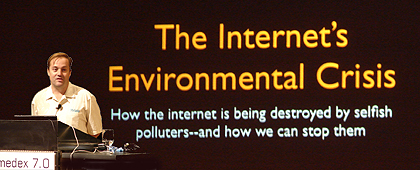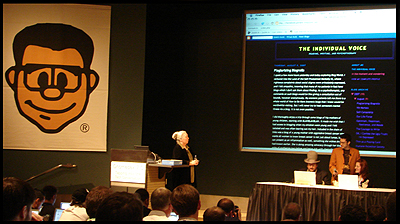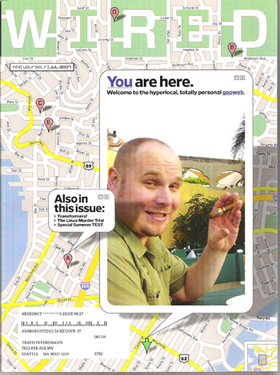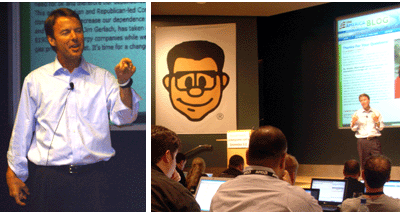
Day one of the Gnomedex conference has come to a close. As I write this, it is 6:20pm, I am offline and have just ordered a Maritime IPA and a cup of clam chowder to enjoy here on the patio of the Fishermans Restaurant and Bar on Seattle’s waterfront. There’s not a cloud in the sky and the sun has just begun to consider falling toward the horizon. This restaurant is an ideal choice as it sits one peer south of the Seattle aquarium where tonight’s Gnomedex reception will begin in less than an hour. The reception should be cool, and I understand that they feed the critters at 8:30, so I’ll plan to be on hand for that spectacle.
The conference today was interesting. It had a bit of controversy, but mostly it focused on conversation about where technology is leading us instead of, perhaps, where we should be leading it. As mentioned in an earlier post, I’m not drawn to this conference for political reasons, and thus, was not overly enthused by the first keynote (Robert Steele). The speaker was great and his presentation very well delivered; I’m just not the audience for it. I loved the focus in a later session, on how technology is missing the boat when it comes to aging members of our society ( but I spoke enough about that in a previous post). Another topic I found interesting was lead by Jason Calacanis and focused on how littered the Internet has become. Spam, ads, junk comments, etc are facets of the web now, annoyances that we all must endure. The Internet has become the Litternet. Mahalo, a search engine that is actually scrubbed by humans to get around the garbage that bubbles to the top of the usual search engine, was discussed as one approach to the problem. Unfortunately, we didn’t get too far down the path of other approaches to the issue.
Almost by accident (but partially because Justin from Justin.tv was in the line up), we spent some time talking about privacy in this new age. Specifically, about being recorded and/or streamed to the Internet with or without ones consent. The topic is an interesting one, but I feel that the result is the same regardless of how much the topic is discussed. Privacy in public spaces is dead. The world is too wired (and wireless) and recording technology is too pervasive to believe otherwise. We can talk about how we’d like it to be until we are blue in the face, but as we do; Smile, because you are on camera!
With that, it is nearly 7pm and I am going to wrap this post up. I’ve eaten my chowder, I’m nearly done with my IPA, and the reception is about to begin.


 I’m probably stooping to new lows right now, but I wanted to quickly do some shameless self promotions, as well as some not-so-shameless promotions of others. First of all, I’m excited to introduce a new feature to the CrapMonkey Website:
I’m probably stooping to new lows right now, but I wanted to quickly do some shameless self promotions, as well as some not-so-shameless promotions of others. First of all, I’m excited to introduce a new feature to the CrapMonkey Website:  Okay, so maybe it’s just my copy.
Okay, so maybe it’s just my copy. 
